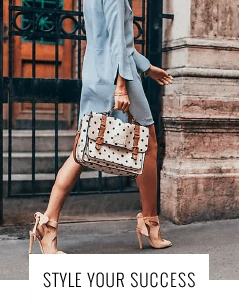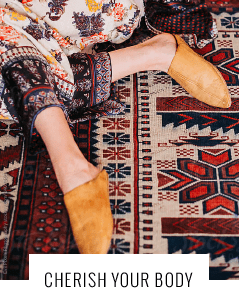Why Feeling Good About What You Wear Can Make You Feel Good About Yourself.
Enclothed cognition is a psychological phenomenon: it is the effects of clothing on your mental and emotional processes. Clothing can change how you think, feel, perceive, and understand yourself during situations and experiences.
Adam Galinsky, one of the foremost researchers on enclothed cognition, said, "It has long been known that clothing affects how other people perceive us, as well as how we think about ourselves."
Interestingly, higher-priced investment items like couture bags or statement jewelry, logos, and certain brands seem to impress others or convey a level of class, status, or achievement.
I think this explains why we splurge on fashion- it's that psychological pay-off that gets our wallets out.
How Can What We Wear On the Outside Affect How We Feel On the Inside?
We've all heard it before: look good, feel good, dress to impress.
Our favorite sweater makes us feel comfortable, cozy, and relaxed. Our favorite heels can put a strut in our stride. And we all have that one fabulous go-to dress that we select from our closet more than any other.
We dress up for interviews, dates, meetings, parties, and church, among other occasions.
When we put on our best leggings before heading to the gym, we feel like an athlete because we look like one.
Wearing a blazer makes us feel professional and prepared because we are dressed for the part.
Even your underwear can affect how you go about the rest of your day. It may be that no one but you will see your panties and bra, but a matching set can make you feel sexy and confident.
Your clothes affect how others perceive you, but more importantly, what you wear affects how you see yourself.
It's often joked that we dress to impress and that shopping is a form of therapy – While funny, like most witticisms, there is some truth to these statements.
Think about the last time you made an extravagant wardrobe purchase. What prompted you to buy that fabulously expensive Bottega Veneta tote, the La Perla lingerie set, or that gorgeous David Yurman cuff?
Did you know that it would make you feel elegant and stylish when you stepped out into the world with it? Did buying it make you feel able, powerful, wealthy, in control, hip, or satisfied?
What we wear does affect how we feel.
Think about getting dressed in the morning. When you change from your soft, flowy pajama pants and top into jeans and a blouse, a business suit, or maybe a tennis dress or yoga togs, there is a noticeable shift in mood and mindset.
You're ready to go – you're prepared to take on the day.
And, at the end of our day, a similar shift happens.
Often, upon arriving home, the first thing we do is change. We kick off our heels and slip into some slides. We trade in our business attire for loungewear. We are signaling that our day of productivity is over, and it's time to rest and relax.
What Is Enclothed Cognition?
There are psychological benefits – and detractions – to clothing and fashion, regardless of the situation.
Scientific exploration of enclothed cognition began with an experiment on lab coats. The study was based on the idea that we think with our bodies and brains. How we feel is primarily based upon physical experiences – including the physical experience of wearing clothes.
The experiment subjects wore either a lab coat or street clothes, and then the authors of the study tested their attentiveness. Those who were wearing the coat had heightened alertness and awareness, more than those who were not every single time.
The act of wearing a white lab coat generated associations made by the subjects. The coat was symbolic of intelligence and focus.
The same thing can happen when we see other people in uniforms or suits. Their apparel makes their position apparent, their skills and abilities are known.
There are clear correlations between style, aesthetics, and mood. In other words, scientific data is showing that what you wear can affect how you feel.
You bought that gorgeous couture bag because it's a reminder that you know your worth.
Perhaps you scored something fabulous at the clearance rack because you are honoring your mindfulness around money – you feel extra great wearing it because you know its quality makes you look terrific. You feel proud about how thrifty you are.
Clothing Creates Feeling
We seek out items that serve as symbols or offer us something we don't feel we have.
Are you more partial to bright, lively colors because they make you feel joyful?
Maybe you prefer soft earth tones because they make you feel sleek and sophisticated.
Whether you go for elegant simplicity or peppy patterns, your style speaks to you and to others.
Maybe a bold nail polish color feels like you're making a statement.
Perhaps you selected a scarf or shawl because you want to feel chic, cozy, and snuggled up.
When Our Wardrobe Doesn't Serve Us
Think about the items in your closet that you never wear. You liked them enough to buy them, but for some reason they never leave the hanger to see the light of day.
Why is that? What is it about that piece of clothing that doesn't serve you?
Maybe they're new clothes you took a chance on because they were the latest fad, but when you put them on, you feel ridiculous.
Perhaps they're old clothes that you have outgrown mentally, spiritually. After all, as we grow and change, so does our style.
You might find that you aren't dressing like yourself, but rather how you think others want you to dress.
Sometimes fashion fails us because we are using it in the wrong way, for the wrong reason. For example, a newly single woman wears an overly skimpy dress for an evening out. She seeks to soothe a bruised ego and mend a broken heart but she only ends up feeling uncomfortable and silly because the look is so out of alignment with who she really is.
Fashion is a way to express ourselves. It's a form of empowerment and self-care. Every item you put on your body should make you feel good about yourself - always.
Clothes, Makeup, and Accessories as Our Voice
Sometimes well-intentioned friends or family members tell us we look beautiful without makeup and don't need it - but maybe we ignore that advice because – psychologically – we do need it.
I knew a woman who wouldn't go to the mailbox without her face wholly made up. But then, she had her nose done. The rhinoplasty was a very subtle modification that her mother didn't even notice. And, everything changed for her. Suddenly she felt so confident that she started going au-natural, all the time, except for special occasions.
I had another friend who had LASEK surgery to repair her eyesight. Even though she had 20/20 vision after surgery, she continued to wear (non-prescription) glasses – especially when working. When asked about it, she said, "I love not needing them because it's so convenient. And, I've worn them all my life. They make me feel like me. But also, my glasses give me a place to shelter; they allow me anonymity when I need it and presence when I want it. They also make me look intellectual and serious, which can be powerful in a boardroom."
To one woman, her morning routine is a sacred time, her makeup an art form. Like a glorious Amazonian Warrior, her makeup is her warpaint, her outfit her armor, her accessories are her weapons.
To another, a natural look makes her feel bold, brave, and daring – she lets the sun paint her face and the wind style her hair.
Maybe you don't wear makeup, but a touch of lip gloss always prompts you to speak up.
Maybe a striking set of earrings remind you to listen.
When we are young, we have security blankets and teddy bears that make us feel safe and comfortable.
When we're adult women, we have our style – makeup, clothing, jewelry, nail polish, hairstyle, shoes – to make us feel boldly confident in ourselves as we move through the world.
Self-Image Makeover
Live Your Life With Style, Flare, and Elegance
IF YOU LIKE IT, SHARE IT






